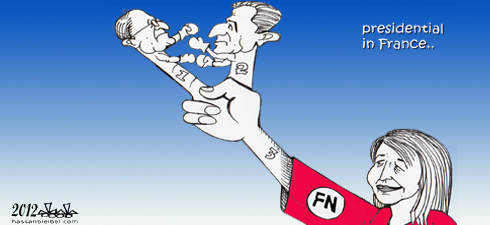The crisis has voted, making its voice heard on a massive scale. The French have not succumbed to democratic disenchantment. On Sunday 22 April, they went to the polls in large numbers [79.47% cast their ballots] on a day which was not marked by the low turnouts for the European and regional votes of recent years.
We should interpret their actions as an expression and renewed confirmation of the predominant role played by the presidential election in our institutional system and the increasing weight attributed to the presidency in French politics. In recent years, this has been buoyed not only by the adoption of a five year presidential term and the decision to have the race for the Elysée coincide with general elections, but also by the concentration of power which has been a feature Nicolas Sarkozy’s hyperactive mandate.
Having said that, the high turnout was mainly prompted by dismay and exasperation at the ongoing economic crisis, rather than enthusiasm for the political programmes on offer. In his bid for a second term, the current tenant of the Elysée Palace was desperate to avoid an anti-Sarkozy referendum in the first round of voting. However, the results speak for themselves: the outgoing president was unable to mobilise the voters who supported him in 2007, or to emerge as the leader after the first ballot.
Like the peoples of the Arab world, the French have opted to send a polite but firm message to their head of state. Let the outgoing outgo: a sentiment that the crisis has also made a feature of the political landscape in most European countries in recent years. In France, our compatriots voiced their dissatisfaction with an imposing surge in support for Marine Le Pen.
Left still not assured of victory on 6 May
The record-breaking performance by the leader of the Front National (who took more than 18% of the vote) was clearly the main development in Sunday’s ballot. The extreme right party has passed another milestone. With her personality, her style and her proposals, the daughter of the FN’s founder has succeeded in the drive to detoxify her party’s image which has been one of her main objectives.
She has also demonstrated a talent, even greater than Jean-Luc Mélenchon’s [the radical left candidate], for surfing the wave of fear that has swept over the working class, which has been hardest hit by the crisis, and to take advantage of an electorate that was seeking a means to voice a resounding protest. It is certain that she aims to build on this success, and regardless of who is returned on 6 May, the final winner will have to take this into account.
François Hollande, who topped the first round poll, was another beneficiary of the popular rejection of Sarkozy, and a trend for tactical voting, which diverted support from the Front de gauche as well as François Bayrou [the centrist candidate]. However, it was by no means a runaway victory. The left has been reinforced by Sunday’s score, but is still not assured of victory on 6 May.
As Nicolas Sarkozy remarked on Sunday night, another campaign is set to begin on Monday. In the run-up to the second round, the two contestants will attempt to win over protest voters and in particular the significant number that gave their backing to the discourse espoused by Marine Le Pen. The best method of accomplishing this goal is, of course, not to appropriate Le Pen’s ideas, but to respond to the real fears and real anger expressed by her supporters.
Extreme-right
Marine Le Pen outdoes her father
“Hollande leads, while Le Pen spoils the party”, announces Libération, in the wake of the first round vote for the French presidential election on Sunday 22 April.
In its editorial, the left wing daily points out that with 6.4 million votes cast for Marine Le Pen, “the extreme right has achieved an unprecedented level of strength in France.” Ten years after Jean-Marie Le Pen obtained 4.8 million votes, which took him into the second round of the presidential election, the situation is “not as tragic but certainly as worrying. Perhaps even more worrying”.
For sociologist Sylvain Crépon, interviewed by Libération, Marine Le Pen’s success, “which is unprecedented on the level of national politics” demonstrates the impact of the strategy to “detoxify” her party, involving the announcement of “a republican basis” for its policies, and a decision to break “with the old guard of the Front National”.
Having launched a process of normalisation, she succeeded in presenting the Front National as an anti-system party which nonetheless wants to be like other political parties, and thus dispelled its sulphurous image. Thereafter, she refocused attention on the core concerns — fear of immigration, and a breakdown in law and order — which have figured large in the provocative noises made by her father. Two tried and trusted ingredients in a recipe that has proved to be remarkably successful.
Was this article useful? If so we are delighted!
It is freely available because we believe that the right to free and independent information is essential for democracy. But this right is not guaranteed forever, and independence comes at a cost. We need your support in order to continue publishing independent, multilingual news for all Europeans.
Discover our subscription offers and their exclusive benefits and become a member of our community now!












